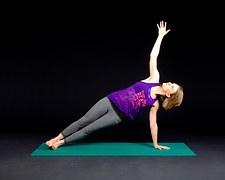Rearranging Ideas about Yoga
 What yoga is, does, and represents is sometimes open to controversy. B. K. S. Iyangar, founder of one of the popular versions of Hatha Yoga, said of yoga that it is a light that once turned on will never grow faint.
What yoga is, does, and represents is sometimes open to controversy. B. K. S. Iyangar, founder of one of the popular versions of Hatha Yoga, said of yoga that it is a light that once turned on will never grow faint.
Misconceptions about Yoga
Yoga’s detractors believe in several misconceptions about yoga that keep them from trying it and receiving its benefits:
1. Vegetarian, Vegan or Not
In order for someone to practice yoga, he or she must be a strict vegetarian. This is not true, although some yogic schools of thought do proclaim that yoga students are not supposed to eat meat at all. They take this stance because one of the precepts of yoga, ahimsa, says that one must be non-harming.
Non-harming may be construed to extend to eating the flesh of animals or it may be further extended to not eating vegetables or grains as they also are living entities. As one can easily see, ahimsa is open to interpretation. If carried far enough, one starves. The Native Americans had their own version of ahimsa. They ate a wide variety of plants and meats, but before eating them, they gave thanks to the entities and creatures who gave their lives so the Native Americans could live.
2. Yoga is a religion that is the antithesis of Christianity
Thousands of years ago yoga and Hinduism were close companions. Today yogic philosophy can be a religion for the people who choose to believe and practice that philosophy or it can be merely be a way to connect with one’s inner guide and the precepts of one’s own religion.
Yoga quiets the mind so the practitioner can easily connect with one’s inner self. If one perceives that inner self as the Higher Self, the Holy Spirit by whatever name, or their God Within is entirely up to each practitioner. One can chose to practice the asanas and reap the benefit of this form of exercise, or one can add practice of the yogic precepts to the mix and gain their benefit also. The choice is entirely up to the student in many forms of yoga.
3. The practice of yoga requires one be in top physical condition
If this were true, there would be few people in yoga classes. Our American diet of processed food, our tendency to get too little exercise, and the endocrine disrupting toxins in our environment that mess with our hormones pretty much ensure that few of us are in peak physical condition. Many people think they lack the physical strength, flexibility, balance and youth to do yoga. What is interesting is that the regular practice of yoga brings flexibility, strength, balance and youthfulness to the practitioners.
It is easy to let negativity about the practice of yoga cloud one’s judgement when these misconceptions are held as truths. But now that they have been cleared away, let yourself enjoy the physical and mental benefits of a style of yoga that meets your needs.


